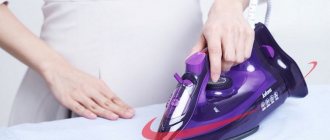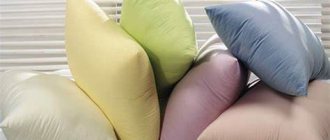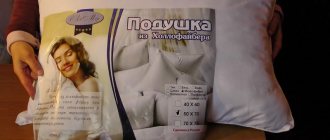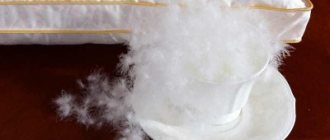90% of people buy pillows on sale in supermarkets without thinking too much about the filling, size or shape. Everything is on the run: beautiful colors, affordable price, but... after several years of not caring about one’s own health, chronic fatigue suddenly sets in.
Instead of a rested face in the mirror in the morning, an exhausted person with swollen eyelids and bags under the eyes looks at you, and yesterday’s optimism is replaced by persistent apathy. And it’s good if there is a somnologist nearby who will explain how to choose a pillow for sleeping so that you greet every new day with a smile. There is nothing complicated about this: and in the article we will go through all the stages of choosing this bedding step by step.
How to choose a pillow for sleeping?
The main task of any pillow is to maintain the physiological shape of the spinal column during sleep. Ideally, the neck should not tilt back or, conversely, press the chin to the chest. Only in this way will the muscles of the entire shoulder girdle completely relax, the blood supply to the brain will be complete, and your sleep will be truly healthy.
Greece is a country where people live longer than other nations, on average by 10 years! The Greeks say the reason for their longevity is the ability to enjoy every minute and surround yourself with comfort. It was here that the first soft pillows were invented, which later conquered the whole world.
Types of pillows
If for several years you have had no problems waking up and greet the morning with a smile, a completely logical solution would be to simply buy the exact same pillow as the old one. But on the other hand, progress is moving forward so quickly that even for the sake of curiosity it’s worth looking into a bedding store. Here you will find:
- classic pillows
, familiar to us from childhood, and often pleasing at a very affordable price; - orthopedic
- hard and terribly uncomfortable when first tested. They are created for people with diseases of the musculoskeletal system, and are not a preventative, but a therapeutic agent. Orthopedic pillows support a person’s head in the desired position all night and effectively relieve muscle tension. They are necessary, for example, for shoulder or neck fractures, severe osteochondrosis, protrusions and herniated intervertebral discs; - anatomical
. They are the ones who know how to adapt to all the bulges and curves of the human figure. These are the ones that make sleeping on them as comfortable as possible. The secret of anatomical pillows is in the small, movable filler. It allows you to achieve the ideal position of your shoulders and neck - the angle between them will be exactly 900, which significantly reduces the likelihood of snoring. Unfortunately, anatomical pillows are expensive, and this is the only thing that prevents them from becoming sales leaders; - bolster pillow
. Somnologists do not recommend sleeping on it all night. But motorists and travelers, summer residents and those who simply like to lie down during the day should keep such a pillow at hand. It is characterized by increased rigidity and the ability to quickly relax tired muscles;
Recently, in stores you can increasingly see pillows that are as long as the entire bed. They are created for couples in love who, even in their sleep, do not want to move away from each other. Unfortunately, such experiments are not good for health. A pillow is a purely individual thing. And it should be selected for a specific person, taking into account his height, shoulder width and even his favorite position while sleeping.
Pillows of all shapes and sizes
The best prices for wholesale purchases in our store
View in the catalog
The first signs that the pillow has served its purpose and it’s time to change it: more frequent bad dreams, body aches, a feeling of slight fatigue after 8 hours of sleep.
Choosing a pillow shape
Today in stores you can see oval and round pillows, orthopedic ones - with variable height and length. But the square and rectangular shape of bedding is still unrivaled. Having such pillows, you can purchase any linen you like without thinking about custom tailoring.
Choosing the size and height of the pillow
Until recently, the most popular pillow size in Russia was 70x70 centimeters. But its position is confidently advanced by the European format – 70x50 centimeters, which is already chosen by 80% of buyers. Rectangular pillows are less bulky and generally more comfortable.
But don’t rush to settle on one - experts recommend that everyone have 2-3 pillows at the same time: a harder one and a softer one. They are vital for people suffering from insomnia or those who, after nightmares, cannot fall back to sleep for a long time. Products of non-standard sizes are perfect as non-main, auxiliary pillows: 50x50, 80x40, 60x40.
The comfortable height of the pillow is also selected individually. It should be equal to the width of a person's shoulder. And maybe 5-9 centimeters for a fragile girl, and 14-17 centimeters for a Russian hero.
Note! For people with bronchial asthma, pneumosclerosis, bronchiectasis, the pillow should be high: above 17 centimeters.
Selecting the firmness of the pillow
Before buying a pillow, doctors recommend lying on it to evaluate how comfortable your rest will be. If this is not possible, it is better to choose a universal product of medium hardness. Soft pillows are ideal for stomach sleepers. But the hard ones are intended for people with diseases of the musculoskeletal system.
If the first night was hectic, do not rush to get upset: getting used to a new pillow usually takes no more than 3-4 nights.
What should the cover be like?
Cases made from synthetic materials look very nice. They are easy to wash, dry quickly and can be an ideal option in winter. But in hot weather, a pillow with a synthetic cover will be hot. Therefore, the best option is still natural linen and cotton.
Pillow dimensions and shape
An incorrectly selected pillow shape can cause snoring, insomnia, numbness in the muscles in the shoulder girdle, and even severe back or neck pain. In order not to encounter similar problems in the future, you should choose a sleeping pillow taking into account individual characteristics. For example, those who sleep with their arm under their head should look at taller models. There are several more important recommendations from experts that you should not forget about when buying a new pillow:
- The height of the pillow should correspond to the height and build of the person. For people with a normal body structure, products with a height of 9-14 cm are suitable, and for those with a larger body, 15-19 cm.
- The dimensions of the pillows are very diverse. But there is a framework of standards, according to which the length of the pillow is from 40 cm to 80 cm, and the width from 30 cm to 70 cm. In order to decide on the choice of these parameters, you need to take into account the width of the mattress, the person’s personal preferences and his body type. The size of the pillow for people of large build should be appropriate.
Regular pillows are made in rectangular or square shapes. They are comfortable enough for a night's rest and allow your neck to relax. However, for those who experience problems with the spine, standard models cannot provide the necessary head support while sleeping. Especially for such people, manufacturers produce orthopedic pillows that have the shape of a cushion or a rectangle with a small indentation for the head.
For cervical osteochondrosis, experts recommend giving preference to crescent-shaped pillows, the ends of which comfortably fix the neck in a certain position. However, this model is not without drawbacks. Unlike rectangular models, you can sleep on it only on your back. For those who are used to turning over while sleeping, it is better to buy an orthopedic pillow with convex edges and a notch in the center.
Choosing a pillow depending on your sleeping position
Universal recommendations for choosing the height and hardness of a pillow should only serve as a guide. Much more important is the position in which it is most comfortable for a person to sleep. It’s easy to determine: try to sleep on your stomach the first night, on your back the second, then on one side and the other. Surely, in some positions sleep will come immediately, in others it will not be cozy and comfortable enough. Also note in what position the alarm clock usually finds you:
- on the back
. Choose a pillow of medium hardness, 8-10 cm high. If we are talking about orthopedic products, you will be most comfortable on a rectangular pillow with a recess for the head; - on the stomach
. Look for the softest and thinnest possible pillow, no higher than 6-8 cm. If you can sleep without it, place a small pillow under your stomach - this way you will avoid lower back pain; - on the side
. Hard pillows have been created especially for you, the height of which should be selected according to the width of your shoulder.
Restless people who constantly turn over in their sleep will benefit from large soft pillows that can be adjusted to any position.
Both doctors and cosmetologists consider the best position for sleeping to be on your back. This way the intervertebral discs can “straighten” as much as possible. And the facial muscles - relax. The result: prevention of osteochondrosis, fresh appearance and elastic skin without wrinkles.
Pillows with natural fillings
The filling of a pillow is no less important than its shape or size. Both the comfort of sleep and the durability of the product itself depend on it. Traditionally, our ancestors stuffed pillows with grass and wool, down and feathers. And today, despite the development of technology, natural fillers do not lose their popularity. They are praised for their ability to absorb moisture and allow air to pass through, but are criticized for being allergenic and difficult to care for. But not everything is so simple: the category of natural fillers is too broad to say definitively whether they are worse or better than synthetic materials. You will have to deal with each of them separately.
| Advantages | Flaws | |
| Duck, swan, goose down, feathers or a mixture of them service life: 5-7 years (from 400 rub.) |
|
|
| Sheep and camel wool service life: 3-5 years (from 700 rub.) |
|
|
| cotton wool service life: up to a year (from 80 rub.) |
|
|
| Natural silk service life: 10-15 years (from 6,000 rub.) |
|
|
| Silk pillows are perfect. Anyone who has ever tried to sleep on them will no longer agree to any alternative. They have the amazing property of cooling in summer and warming in winter, so sleeping on them is comfortable, regardless of the season. In addition, according to healers from the East, sleeping on straightened silkworm cocoons is the best way to preserve youth. | ||
| Buckwheat and rice husks service life: about 2 years (from 1,000 rub.) |
|
|
| Bamboo fiber (a type of viscose, the raw material for which is young bamboo) service life: 5-7 years (from 700 rub.) |
|
|
| Real bamboo pillows are still a rarity; instead, customers are often offered bedding with synthetic filling. It’s easy to check the quality: just try breathing through the pillow. It didn’t work out - they are trying to deceive you, since bamboo fiber is highly breathable. | ||
| Seaweed service life: 3-5 years (from 1,500 rub.) |
|
|
| In the production of algae filler, only a mechanical method of processing raw materials is used. Therefore, this filler is free of toxins, allergens, and chemically active substances. Seaweed pillows are recommended for people with dermatological problems: acne, acne, dandruff, premature skin aging. | ||
| Horsehair service life: 5-7 years (from 900 rub.) |
|
|
| Kapok fiber or ceiba (cotton extracted from kapok trees - the maltaceae family) service life: 10-12 years (from 1,000 rub.) |
|
|
Every year more and more pillows with exotic fillings appear on the shelves: corn fiber or palm fiber and dog hair. You should treat them with caution, buying only certified products.
Pillows stuffed with aromatic herbs: motherwort, lemon balm, chamomile or eucalyptus are good only for short-term rest. You shouldn’t sleep on them all night, especially since to enhance the smell, would-be sellers often add a few drops of essential oil inside. And this can not only not balance a person’s physical and mental state, but also cause nausea, headaches, and a severe allergic reaction.
Basic requirements for a good pillow
Since a person’s overall well-being depends on the characteristics of a pillow, there are important requirements that apply to a new product when purchasing. They can be formulated as follows:
- preservation of the original form;
- absence of foreign odors;
- hypoallergenic;
- ease of care;
- fabric strength;
- performance properties of the filler.
Considering the fact that the range of pillows on sale is quite wide, it is quite difficult to purchase a truly comfortable product at an affordable price. To avoid mistakes when choosing, it is better to familiarize yourself with the ratings of popular models. You also need to know which characteristics you should pay attention to first.
Pillows with artificial fillings
Just 20 years ago, pillows with synthetic fillings could not even come close to competing with natural ones in terms of comfort and durability. But technology has stepped far forward: even today, bed linen with artificial fillers is not so much a vital necessity for allergy sufferers, but an excellent alternative to the usual down and feather products.
| Advantages | Flaws | |
| Sintepon service life: 1-2 years (from 200 rub.) |
|
|
| Silicone (siliconized padding polyester) service life: 5-7 years (from 400 rub.) |
|
|
| Fiberlawn (plastic filler without adhesive base) service life: 3-4 years (from 200 rub.) |
|
|
| Holofiber, ecofiber, comforterel service life: 3-5 years (from 300 rub.) |
|
|
| Swan's down, synthetic down, polyester (improved holofiber) service life: 4-6 years (from 600 rub.) |
|
|
Latex.
Latex stands apart. Most high-quality orthopedic pillows are made from it. And, despite the fact that sellers swear that it is 100% natural, the material cannot be like that by definition. The maximum possible content of natural liquid latex in any product is 85%. And this is only the case if the pillow is made in a “rubber belt”. The further from the equator, the more stabilizing additives have to be used in production.
And this is not bad at all: a pillow consisting of 85% natural foam rubber will last no more than 4 years, and will cost several times more than silk. But for products made with the addition of synthetic materials, manufacturers provide a guarantee of up to 10 years. And, as experience shows, a good latex pillow lasts at least 30 decades!
Latex allergy occurs in 1% of people. It manifests itself with itching, redness of the skin and eyes, nasal congestion and watery eyes.
The minimum price for a latex pillow is 2,500 rubles. But this is more than compensated by its properties:
- hygiene
: dust mites cannot live in latex products; - antibacterial properties
: rot does not develop in latex; - no creaking or rustling noise
; - pronounced orthopedic effect
: latex pillows retain their rigidity throughout the entire period of operation; - record durability
.
Latex also has disadvantages. This is a peculiar sweetish-milky smell that does not disappear for a very long time. In addition, the pillow does not heat up during sleep, so after using down products, it is very difficult to get used to it and feel comfortable, especially in the winter months.
Scientists are still searching for the ideal filler. A current research topic is the combination of polyester fibers with natural materials. The task of synthetic threads is to hold the shape, while the task of natural threads is to fill the gaps. Thus, wool imparts warmth to products, bamboo fiber provides hygroscopicity, and eucalyptus protects against the development of pathogenic bacteria.
Pillows with any filling
Best prices for bulk purchases
Pillows with natural and synthetic filling in the catalog
View in the catalog
Which synthetic filler is better to choose?
There is a wide selection of the following artificial fillers on the market:
- Polyester - the material repels dust, is cheap, suitable for use by allergy sufferers. In the summer it can be hot, after ten months threads begin to come out of the seams, the “dumka” itself becomes flat and cakes. Inexpensive polyester accessories are bought as temporary summer cottage options.
- Holofiber is the same polyester, only additionally processed. The processed polyester fibers are twisted into “balls” and then coated with silicone, which makes the products less caking over time. It has all the disadvantages of the “parent”, the advantage is that it does not cake longer.
- Sintepon is batting compressed at high temperature. Do not wash frequently (it quickly deteriorates when exposed to moisture). The pillow is short-lived - after a few months of use, a “pit” will become noticeable near the place where the head is located during sleep, indicating the need for a new purchase.
- “Swan's down” is a polyester fiber, spirally twisted, then treated with silicone on top (another name is “thinsulate”). Lightweight, safe for asthmatics and sensitive people, practical (can be washed by hand or in a machine), unattractive to ticks. Disadvantage: electrification of fibers, reduced hygroscopicity. Fibers can electrify the hair, and with increased sweating of the scalp, the pillow itself can get wet. Does not tolerate bleaching. “Works” for at least 5 years.
- Silicone is polyester converted into hollow fibers. Washable with a bang at home, soft, easily restored to shape, it is used in orthopedic pillows. The price is attractive. Silicone is short-lived (the service life is the same as padding polyester).
- Foam (“memoriform”) – used for anatomical products. The viscoelastic consistency remembers the structural features of the body, maintaining orthopedic qualities for ten years. Parasites, mold, and fungi do not like to live here, which means that sensitive people can use “memoriform” items on a daily basis. It is not necessary to clean with abrasive substances, just shake periodically. The only downside is that they are expensive.
- Microfiber is a synthetic material, an analogue of natural fluff. Lightweight, durable, thin, repels odors, easy to clean, disadvantages: electrified and does not absorb water well, therefore impractical. The duration of an adequate “life” is five years.
- Viscoelastic – translated as “slowly restoring shape.” This is a porous fiber (flexible cells that allow free air circulation). Can't be washed, odors are repellent, price is high. A successful long-liver.
- Microgel is a synthetic filler, an analogue of down without its disadvantages (neutral for sensitive allergy sufferers). Can be washed at home, dries easily, hygroscopic. Microgel pillows will cost a decent amount, but their service life will be ten years.
Cleaning pillows at home
Additional functions
The evolution of pillows seems to know no end. It’s not enough for manufacturers to experiment with shape and filler; now some companies have decided to give auxiliary functions to the usual bedding. This is how they appeared:
- face mask pillows.
A cover soaked in vitamin E and aloe vera extract has a relaxing and rejuvenating effect on the skin while you sleep. True, the manufacturer forgot to specify exactly what position you should sleep in for this; - pillow player.
With its help, you can listen to relaxing music and even the radio before going to bed. The products are equipped with a connector for an MP3 player and a USB port for charging; - alarm pillow.
The built-in timer counts down the minutes until you wake up, and you can always see the time on the luminous dial. The pillow can wake up its owner either with a sound signal or vibration. Well, some models have a built-in function of a light electric shock if a person does not wake up for a long time; - massage pillow.
Such an assistant is indispensable after a hard day at work, especially if it is not the cheapest model, but a pillow with several modes of exposure; - heated pillow.
It will heat the product in just a few seconds and make the bed more comfortable; - cooling pillow.
And this is already a model for summer. It is filled with a special gel that can reduce the temperature of a person’s skin by as much as 40C. And what is more important is to hold it for an hour; - pillows with a pocket for the remote control
so that the essentials are always at hand; - talking pillows: they know how to greet you in the morning, and will always give practical advice on how to fall asleep faster if you have been tossing and turning for the second hour in a row;
But the most popular of all unusual pillows is the product in the shape of a man’s shoulder and arm. It was created for those girls who are tired of loneliness. But, in fairness, we must admit: these pillows are indeed very comfortable.
Fabrics for napkins
The material protecting the filling must be dense enough to hold it securely, and also delicate if the owner does not want to use an additional pillowcase. Popular fabrics for making pillows include:
- Teak is a dense fabric made of linen or cotton. It is made by plain or twill weaving of threads. Traditional material for making pillows or mattresses.
- Calico is a thick linen fabric made of cotton. Lightweight, hygienic material, practically does not wrinkle and retains color brightness well when dyed.
- Linen is a natural fabric made from fibers of the plant of the same name. The material is light, delicate, suitable for soft fillers and for summer use.
- Polycotton is a mixed fabric, a practical combination of natural cotton and synthetic polyester. Traditional material for making bedding. Durable, wear-resistant, easy-care fabric.
- Flannel is a warm fabric with brushing (one-sided or double-sided). Made from wool and cotton. The threads are joined using twill or plain weave. Absorbs moisture well, but takes a long time to dry. Not suitable for products that are planned to be used in summer. Over time it rolls off.
Manufacturers
In 2016, experts from Roskachestvo for the first time conducted an all-Russian study of the quality of pillows. During it, 27 samples of the most popular brands in Russia were tested. The evaluation of products from different price categories, with fillers made of natural, synthetic and mixed fibers, was carried out in several categories:
- pH level. It is not regulated by law, but since the fabric is in contact with the delicate skin of the face all night, Roskachestvo puts forward a requirement to set a maximum level of 7.5 units;
- Ignition speed.
- Hygroscopicity.
- Compliance of the declared sizes with the actual ones.
- Compliance of the filler with what is stated on the packaging.
Pillows of the following brands did not pass the tests: "A'Elita", "Horizon", "Podushkino", "Pierrot", "Samson", "TekStil", AlViTEK, BELASHOFF, Comfort line, ECOTEX, Green Line, OL-TEX, Sortex , VEROSSA, “Every day”.
Pillows from the following brands coped well with the tests: Asabella, Dream Time, IKEA, MONA LIZA, Primavelle.
Pillows that exceeded the experts' expectations were: "Light Dreams", "Lezheboka", German Grass, Kariguz, Nature's, Togas House of Textile, Dargez.
Alas, Roskachestvo experts have not yet taken up the study of orthopedic pillows. Therefore, when choosing them, you can rely solely on customer reviews. According to them, the best pillows are called:
- Luomma (Finland);
- Sissel (Sweden);
- Tempur (Denmark).
Unfortunately, the products of these brands are quite expensive. Therefore, you can start getting acquainted with memory foam pillows with more affordable brands: Chinese Trelax, American, but produced in Taiwan - Fosta and domestic Trives.
Tips for choosing
In addition to the height, shape, cover material and composition of the pillow filling, it is important to consider other points when purchasing:
- Mattress hardness level
. If it is soft, the pillow needs to be lower, since the body will sink into the bed even without it. If the mattress is hard, the pillow should be slightly higher than the recommended value. - Teak fabric
. Hard, unpresentable - it is an ideal option for down and feather pillows. Only she can smooth out the heterogeneity of the filler and block the feathers from getting out. Therefore, the cover of a high-quality down and feather pillow is always made of teak. - Even lines
. It is sloppy tailoring that clearly reveals a careless manufacturer. High-quality pillows are sewn impeccably and, as a rule, have either a double outer seam or an inner seam, which can be identified by a decorative piping. This design makes the pillow stronger. - Availability of complete information on the label
: fabric, composition and weight of filler, care recommendations, manufacturer contacts. If there is no data, the company clearly has something to hide, and such a purchase may subsequently have a negative impact on health. - Elasticity
. There is a simple quality test: press the palm of your hand onto the pillow. A good one will restore its shape in less than 5 seconds, a bad one will either not do this at all, or will return to its original state too slowly. - Sufficient amount of filler
. Take the pillow by the corner and shake it. If it loses its shape, there is not enough filler, and the head will always fall in during sleep.
The inscription “Swan's Down” is just a marketing gimmick. Swans have long been listed in the Red Book, so there will almost certainly be a synthetic filler inside the pillow.
Pillows for osteochondrosis
The “correct” pillow for osteochondrosis is small, rectangular, of medium hardness. As a filler, it is better to choose buckwheat husk, bamboo fiber or latex - materials that can hold their shape well and not bend under the weight of the head. Buckwheat husk, in addition, also improves blood flow due to its soft massaging effect.
If you are bothered by headaches and dizziness every morning, and x-rays have long ago confirmed the diagnosis of “Cervical osteochondrosis,” it’s time to change your pillow - it was chosen incorrectly! What is the mistake, it is better to consult a doctor.
Pillows for allergy sufferers
Latex pillows, as well as bamboo and buckwheat fillings, are considered relatively safe for allergy sufferers. Unfortunately, even these materials can cause individual reactions. In this case, the only option left is a pillow filled with natural silk. She is expensive, but habitually soft and gentle.
Synthetic pillows filled with silicone, holofiber or synthetic padding are also suitable. It is believed that dust mites, traces of whose vital activity causes allergies, do not live in artificial materials. It is not true! It’s just that such pillows can be washed, and the tick and its eggs die at a temperature of 600C.
It is impossible to completely get rid of dust mites in an apartment. But you can reduce its amount if you reduce the humidity in the room and do not allow the temperature to rise above +220C.
Price policy
The cost of a pillow directly depends on the filler, since this is the main criterion that determines the pricing policy.
- Down and feathers - from 1500 to 6000 rubles.
- Wool - from 2000 to 3500 rubles.
- Filler of plant origin - from 500 to 2000 rubles.
- Holofiber - from 500 to 2000 rubles.
- Comforel - from 1000 to 1500 rubles.
- Sintepon - from 200 to 500 rubles.
- Silicone - from 700 to 2000 rubles.
- Latex - from 2000 to 4000 rubles.
- Gel – from 5000 to 8000 rubles.
- Silk - from 6,000 to 15,000 rubles.
Which pillow is right for a child?
A child under one year old does not need a pillow! Therefore, rolled up diapers and flat pillows are only a means to reassure a mother who is convinced that without a full set of bedding, her son or daughter will be uncomfortable. The same goes for newfangled orthopedic pillows for babies.
Their only advantage is that, even after turning over, the child is guaranteed not to suffocate, thanks to the “breathable” materials. Initially, they were created exclusively for medicinal purposes: for example, to relieve muscle hypertonicity or correct cranial deformities. A healthy child does not need an orthopedic pillow, but it can be used after consultation with a pediatrician.
At 12 months, you can offer your child a hypoallergenic pillow, 40x60 cm in size and 2-3 cm in height. The main requirement for it is resistance to frequent washing. Starting from 2 years old, the baby can already switch to the lowest pillow for adults, measuring 50x70 centimeters with a filling made of high-quality siliconized fiber.
Comfortable and useful children's
Weak cervical vertebrae and body proportions different from those of adults impose certain requirements on children's sleeping pillows. And, of course, the main requirement for them is hypoallergenicity, because the young body has not yet adapted to the challenges of the surrounding world.
For babies and children up to six months, special high-quality pillows and orthopedic mattresses for newborns are produced. Calico material is popular. It does not cause allergies, and its moisture-absorbing properties make sleeping on them pleasant and restful. Coconut coir, bamboo charcoal, horsehair and other hypoallergenic natural materials allow you not to worry about your child’s sleep.
The sizes of baby pillows depend on the age of the baby. Do not use pillows for a long time. The child grows quickly, which means that the pillow that was ideal six months ago will no longer suit him today.
Healthy and restful sleep depends on many factors. The pillow is one of them. The speed of falling asleep, vigor after the night, the convenience of relaxing together, and so on are influenced by many factors. The height and width of the pillow, the material, even the color and aspect ratio matter. The choice of this important device for supporting the head in a natural position must be approached with all seriousness and awareness of the importance of sleep in our lives. You need to be especially careful when choosing if your newborn is diagnosed with torticollis. Then you will need a special orthopedic pillow.
Choosing a pillow for pregnant women
Starting from the second trimester of pregnancy, the expectant mother begins to worry about sleep problems. At this time, it is worth purchasing a special pillow for sleeping, which will reduce the load on the lower back and help you find the optimal position for your growing tummy. There are many forms of pillows for pregnant women, but the most popular are:
- "Horseshoe"
. This pillow resembles the letter “U”, takes up a lot of space in the bed, distances you from your beloved husband, but, according to customers, is the most comfortable model. It provides support for both the stomach and back at the same time; - "Roguelike"
. Suitable for a small bed. But when turning to the other side, you will have to turn over the pillow, otherwise the lower back will be left without support; - G-shaped
. A new variety that has just appeared on the market; - "Banana"
. The most compact pillow for pregnant women: its small size allows you to take it with you when visiting or traveling. The natural curve follows the shape of the body of a person lying on his side.
All models of pregnancy pillows are available in two sizes, and are selected based on the woman’s height. But the fillings of such pillows are always synthetic: they are easy to care for, they have a low price, and the shortcomings of the artificial material simply do not have time to appear in a few months.
Buying a pillow for pregnant women is not a useless purchase. After the baby is born, it will be very convenient to feed the baby. And when the baby grows up, this particular pillow will become a cozy “nest” for the first games and reliable support during the first attempts to sit down.
Pillow buyer checklist
Having stocked up on theory, now you need to understand what to do if there are a lot of pillows in the store, and a zealous consultant is already persuading you to buy. Here is a checklist of your actions:
- Tell the consultant what kind of pillow you are looking for (hardness, materials, cost). Find out if you have problems sleeping.
- Feel free to ask consultants about the properties of pillows, fillings, and covers. Moreover, it is advisable that they explain to you what features of the materials allow the pillow to breathe, remove moisture, and so on.
- Try lying on the provided pillows. Evaluate your feelings. With the correct height and shape of the pillow, you should feel relaxed, there should be no clamps or kinks anywhere.
- Remember, or better yet, write down the characteristics of the pillows offered to you. At home, read about the properties of specific fillers. Read reviews of pillows from selected brands.
- No matter how carefully you choose a pillow in a store, you have to sleep on it for a week to evaluate it. Because the comfort of the pillow will even depend on your mattress (the softer it is, the thinner the pillow should be). So find out if you can test the pillow at home and return it if it doesn't work. The Law “On the Protection of Consumer Rights” allows for returns if the goods have not been used and the appearance, consumer properties, seals, and factory labels have been preserved. But some stores are meeting customers halfway. So, IKEA suggests sleeping on a new pillow for 14 days and exchanging it if it turns out to be uncomfortable.
Is it possible to sleep without a pillow?
Somnologists categorically do not recommend sleeping without a pillow! It is easy and simple to verify this experimentally: try sleeping on a bare mattress for at least a couple of nights. Swelling of the eyelids, numb limbs and a broken state are guaranteed to you! But these are far from the worst consequences of a rash act. Those people who sleep without a pillow regularly are at much greater risk:
- firstly
, the tilted position of the head reduces the clearance of the airways, and the person snores more; - secondly
, tension in the cervical vertebrae during sleep will sooner or later lead to the development of osteochondrosis; - thirdly
, sleep without a pillow is often interrupted. Due to the fact that the head is lower than the body during sleep, saliva enters the respiratory tract. And after the cough comes awakening. Several such cycles per night, and chronic fatigue is guaranteed; - but most importantly
: sleeping without a pillow leads to impaired cerebral circulation. Its first symptoms are decreased performance, regular headaches, and ultimately an ischemic stroke.











